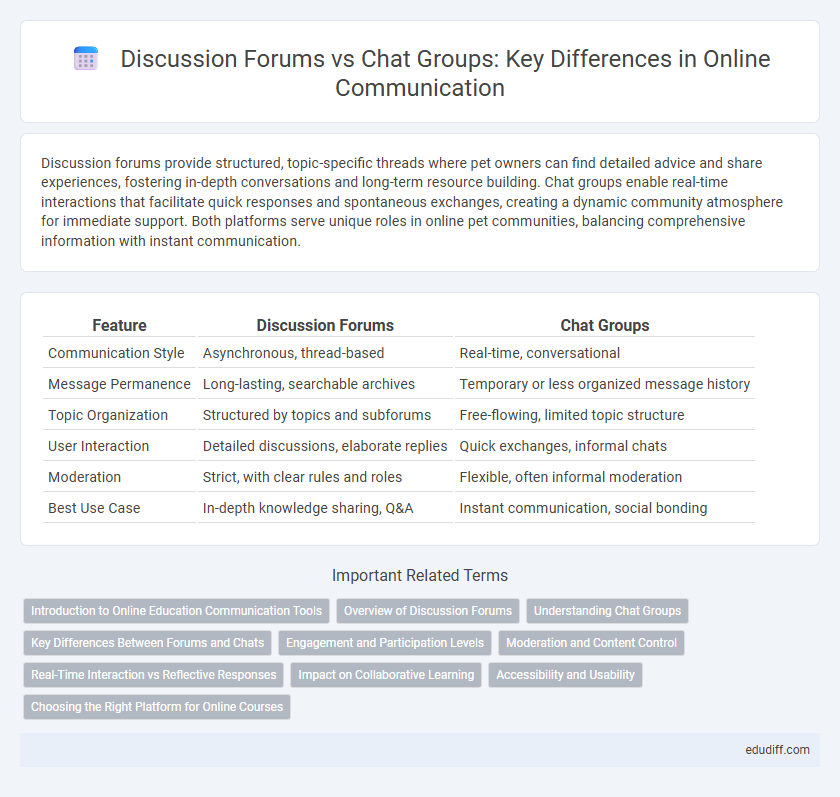Discussion forums provide structured, topic-specific threads where pet owners can find detailed advice and share experiences, fostering in-depth conversations and long-term resource building. Chat groups enable real-time interactions that facilitate quick responses and spontaneous exchanges, creating a dynamic community atmosphere for immediate support. Both platforms serve unique roles in online pet communities, balancing comprehensive information with instant communication.
Table of Comparison
| Feature | Discussion Forums | Chat Groups |
|---|---|---|
| Communication Style | Asynchronous, thread-based | Real-time, conversational |
| Message Permanence | Long-lasting, searchable archives | Temporary or less organized message history |
| Topic Organization | Structured by topics and subforums | Free-flowing, limited topic structure |
| User Interaction | Detailed discussions, elaborate replies | Quick exchanges, informal chats |
| Moderation | Strict, with clear rules and roles | Flexible, often informal moderation |
| Best Use Case | In-depth knowledge sharing, Q&A | Instant communication, social bonding |
Introduction to Online Education Communication Tools
Discussion forums provide structured environments where learners can post questions, share resources, and engage in thoughtful, asynchronous debates, enhancing critical thinking and in-depth understanding. Chat groups enable real-time interaction and immediate feedback, fostering collaboration and a sense of community among online learners. Selecting the appropriate communication tool depends on course objectives, learner preferences, and the desired balance between prompt engagement and reflective dialogue.
Overview of Discussion Forums
Discussion forums serve as structured online platforms where users post messages organized by topics, enabling in-depth, asynchronous conversations that can be referenced over time. These forums offer categorized threads, user moderation, and searchable archives, making them ideal for detailed discussions and knowledge sharing across various subjects. Unlike chat groups, they prioritize thoughtful responses and long-term information retention, fostering a collaborative learning environment.
Understanding Chat Groups
Chat groups provide real-time communication that enhances immediate interaction and fosters dynamic conversations among members. Unlike discussion forums, chat groups support continuous, fast-paced exchanges ideal for collaborative projects and quick decision-making. Their informal structure and instant messaging features make chat groups effective for maintaining ongoing social connections and spontaneous discussions.
Key Differences Between Forums and Chats
Discussion forums organize conversations into structured threads, allowing users to post and respond asynchronously, which fosters in-depth, searchable content over time. Chat groups enable real-time, rapid exchanges with informal dialogue, emphasizing immediacy and casual interaction. Forums prioritize long-term knowledge retention and topic categorization, while chat groups excel in spontaneous communication and dynamic group engagement.
Engagement and Participation Levels
Discussion forums foster higher-quality engagement by allowing users to contribute thoughtful, well-structured posts and enabling in-depth topic organization. Chat groups encourage real-time interaction, increasing participation frequency but often resulting in shorter, less detailed exchanges. Platforms combining asynchronous forums with synchronous chat features can optimize user engagement and participation levels effectively.
Moderation and Content Control
Discussion forums offer structured moderation tools that enable detailed content control through threaded conversations and clearly defined moderation policies, fostering organized and focused discussions. Chat groups require real-time moderation techniques to manage spontaneous interactions, often relying on automated filters and quick responses to maintain respectful communication. Effective moderation in both platforms is essential for preventing misinformation, spam, and abusive behavior, ensuring a safe and engaging online community.
Real-Time Interaction vs Reflective Responses
Chat groups enable real-time interaction, facilitating immediate communication and dynamic conversations among participants. Discussion forums promote reflective responses by allowing users to consider and craft thoughtful replies over time. The choice depends on whether instant engagement or in-depth analysis is prioritized in the online environment.
Impact on Collaborative Learning
Discussion forums foster deep, reflective learning by allowing participants to post detailed responses and engage asynchronously, which enhances critical thinking and knowledge retention. Chat groups encourage real-time communication and quick idea exchange, promoting spontaneous collaboration and active participation. Both platforms contribute uniquely to collaborative learning, with forums supporting in-depth analysis and chat groups facilitating immediate feedback and dynamic interaction.
Accessibility and Usability
Discussion forums provide structured, searchable archives that enhance accessibility for users seeking detailed, topic-specific information over time. Chat groups prioritize real-time interaction with intuitive interfaces designed for quick communication, promoting immediate usability but often lacking long-term content organization. Both formats cater to different user needs, where forums excel in information retrieval and chat groups facilitate dynamic, accessible conversations.
Choosing the Right Platform for Online Courses
Discussion forums provide structured, subject-focused threads ideal for deep learning and long-term reference in online courses. Chat groups foster real-time interaction and quick feedback, enhancing learner engagement and immediate problem-solving. Selecting the right platform depends on course goals, with forums suited for detailed discussions and chats optimized for dynamic, collaborative experiences.
Discussion forums vs Chat groups Infographic

 edudiff.com
edudiff.com